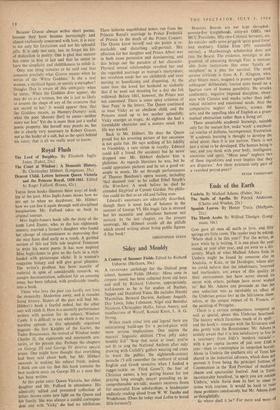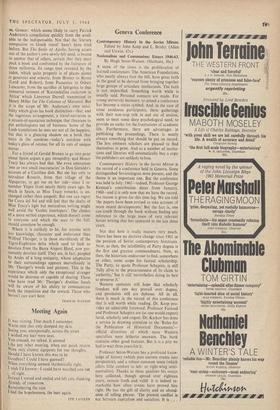Ends of the Earth
Umbria. By Michael Adams. (Faber, 36s.) The Smile of Apollo. By Patrick Anderson. (Chatto and Windus, 25s.) The Marsh Arabs. By Wilfred Thesiger. (Long- mans, 36s.)
GOD gave all men all earth to love, and fifty springs are little room. The reader may be asking, 'Where shall it be this year?' For the writer, at least while he is writing, it is one place the year round, or year after year, and yet even so a dis- covery. Much of what Michael Adams finds in Umbria might be found by someone else in Anatolia, or Kulu, or the Dordogne, where also we could believe that the inhabitants, 'reserved and inarticulate, are aware of this quality ia their environment but have never shared its secret with others, perhaps have never wished to.' But Mr. Adams can persuade us that his own seduction was as inevitable an effect of the Umbrian genius loci as the hill-towns them- selves, or the unique impact of St. Francis, or the painting of Perugino.
There is a certain compactness, temporal as well as spatial, about this Umbrian heartland. The history which furnishes much of its spell— and the book's—emerges with the Etruscans and dies gently with the Renaissance. Mr. Adams is acutely aware that it is less satisfactory to live in a sanctuary from Italy's 'modern miracle— with a per capita income of just over £100 s year—than to contemplate its unspoiled beauty. Alone in Umbria the southern city of Terni has shared in the industrial advance, which does net prevent it from being the principal fortress Of Communism in the 'Red Province' of mediaeval charm and spectacular festival. And in Tern', incontestably benefited, 'in spirit you are outside Umbria,' while Assisi does its best to come to terms with tourism. It would be hard to treat these problems conclusively, but Mr. Adams does so thoughtfully.
So where shall it be? For more and more of
us, Greece: which seems likely to carry Patrick Anderson's compilation quickly from the avail- able to the indispensable. Not that the 'literary companion to Greek travel' hasn't been tried before. But The Smile of Apollo, having arisen out of the author's own newly-felt need, is bound to answer that of others, certain that they must pack a book and confronted by the literature of three millennia. Its range (not revealed by the index, which quite properly is of places alone) is generous and eclectic, from Homer to Byron (Lord and Robert), from Pausanias to Osbert Lancaster, from the sacrifice of Iphigenia to that immortal moment of `Katsimbaline cockcrow in Attica' which Lawrence Durrell transmitted to Henry Miller for The Colossus of Maroussi. But it is the scope of Mr. Anderson's own sensi- bility which gives his book distinction—that, and the ingenious arrangement, a travel-narration in a stream-of-quotation technique that threatens to put anthologisers out of business. Sonic of the Loeb translations he uses are not of the happiest, but that is a glancing shadow on a book that stays in the sunshine—today's sunshine with today's glass of retsina, for all its vats of unique nectar.
For a friend of Gerald Brenan to go into print about Spain argues a gay intrepidity, and Honor Tracy has always had that. She even announces 'one or two small inaccuracies' in Don Geraldo's account of a Castilian dish. But she has only to introduce Rosario, from that village of the Alpujarras, to get me on her side—since I re- member Yegen from nearly thirty years ago. So much in Spain, as Miss Tracy remarks, is un- changed rather than unspoilt. But one can regret the Costa del Sol and still feel that the shafts of Miss Tracy's light but meticulous writing might well avoid the 'Gothic interlopers.' The chance of a more settled experience, which doesn't come to everyone and which she uses to the full, Should somehow be enough.
Where it is unlikely to be, for anyone with less knowledge, character and endurance than Wilfred Thesiger, is in those marshlands of the Tigris-Euphrates delta which used to look so desolate from the Basra Airport Hotel, now pre- sumably desolate itself. They are, in fact, peopled by Arabs of a long antiquity, whose adaptation to their surroundings appears marvellously in Mr. Thesiger's words and pictures. This is the experience which only the exceptional stranger would be desirous or capable of sharing. Those Who have read Mr. Thesiger's Arabian Sands Will be aware of his ability to communicate both the impulsion and the reward. Those who haven't can start here.
FRANCIS WATSON































 Previous page
Previous page